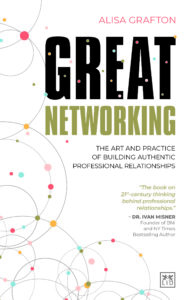|
How to De-Construct the Unhelpful Beliefs about Networking by Alisa Grafton
By Guest Contributor Alisa Grafton, Author of Great Networking
“I hate networking”, a friend recently confided in me. “Why?”, I wondered.
“I never know what to say to a complete stranger, I’m afraid to get stuck with a bore, and I hate selling myself”, she had her reasons at the ready. And they were hard to argue with.
I, too, know what it feels like to have a blank mind, to be monologues at for 20 minutes without a break, and don’t even start me on the sense of awkwardness at the expectation to deliver a compelling pitch as to why my services are better than anything else under the sun!
In fact, have you ever met anyone who’s not wary of these less pleasant aspects of networking??
But in the same way that a bad dating experience should not put you off love, horrible networking stories should not cloud your chances of forming great connections in the professional world.
Like with any other social situation, success is not a given. This is the case whether you come prepared or not. The true secret is to know when to use a perceived failure as an opportunity to learn a thing or two about yourself to enhance your networking skills, and when to merely put it down to experience, to understand that we are not in charge of everyone’s agenda.
You see, sometimes meeting you is not on the agenda of the person that you came up to say hello to. However, what is on their agenda is keeping an eye on their back-to-back meetings schedule, listening out for the phone call they’re expecting from their kid’s school whist tracking down that client that has been avoiding their email lately but is attending the networking event this evening. In short, the person you are speaking to may have such a hefty to-do list that there is no bandwidth left to be socially skillful today. We all have days like that – so just, erm, let it go, and move on.
There is a real, practical skill in not taking things personally when it comes to networking. Even for the more experienced among us, it takes a conviction to genuinely comprehend and master that mindset.
Being in the midst of a challenging networking scenario is a sure way to learn a lot of precious things about ourselves.
Do we feel compelled to stay around a person who does not seem to pay us much attention? Then it might be the time to question your readiness to expect the respect and the interest from the other person. Because – if there’s no respect and interest on both sides in an interaction, you’re wasting your time.
Are we under the false belief that somehow the rejection on the part of another person defines our place in the universe? In such a case, perhaps our personal challenge is to separate the value that we believe we have from what other people think of us.
Do we feel unsure whether we are qualified to be in the same room as other people? The impostor syndrome is very real, and the first step in dealing with it is to acknowledge that it is sabotaging your self-worth, but it does not have to be the case.
In my book, Great Networking: the Art and Practice of Building Authentic Professional Relationships, I de-construct the unhelpful beliefs that many of us have about networking, and instead provide you with a different framework – the helpful kind, and the one that actually does help.
ABOUT THE AUTHOR
 Alisa Grafton is a partner at De Pinna Notaries, a leading legal notaries firm, and assists law firms, investment banks and multinationals to execute cross-border transactions. She is also active in female leadership and is a mentor for the Athena40 Forum. She is based in London.
Alisa Grafton is a partner at De Pinna Notaries, a leading legal notaries firm, and assists law firms, investment banks and multinationals to execute cross-border transactions. She is also active in female leadership and is a mentor for the Athena40 Forum. She is based in London.
Suggested Reading

In order for you to obtain valuable information or help from your contacts, you yourself must be valuable and generous to others. Therefore, one of the key points of Great Networking is building the right kind of professional relationship – and here, authenticity should be at the core of your networking. The author provides proven advice on how to build relationships strategically, that will last for the long term, and will bring mutual benefits. At the same time, the author stresses the importance of you remaining true to yourself and your core beliefs.
